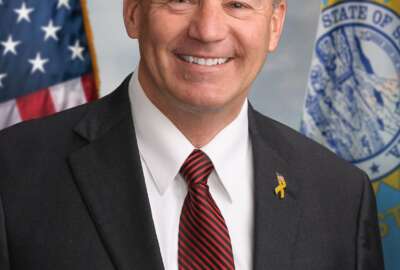Best listening experience is on Chrome, Firefox or Safari. Subscribe to Federal Drive’s daily audio interviews on Apple Podcasts or PodcastOne.
The Public Health Service is in charge of everything from containing disease outbreaks to giving Coast Guard service members dental care. The service was supposed to have a ready reserve corps after Congress approved it in 2010, but a few legislative hiccups kept it from becoming a reality.
Now, almost 10 years later, Congress is trying to rectify the issue with the United States Public Health Service Modernization bill, which has bipartisan support in both the House and the Senate.
“The language would provide a technical fix to an existing authorization for a ready reserve corps,” John McElligott, deputy executive director of the Commissioned Officers Association of the U.S. Public Health Service, told Federal News Network. “It provides a technical fix that would actually pay people who would be serving in it. It conforms existing legislation and actually allows the Health and Human Services Department to create a real reserve component, recruit people to be in it, have people deploy to domestic emergencies and to backfill positions of active-duty members.”
On Oct. 31, the Senate Health, Education, Labor and Pensions Committee voted in favor of the bill, allowing it to go before the whole Senate. Sens. Mike Rounds (R-S.D.) and Doug Jones (D-Ala.) sponsored the Senate version of the bill.
“Alabama knows all too well the full spectrum of natural disasters and the devastation they can bring on our communities, especially in our most rural areas that lack immediate access to services and resources,” said Jones. “When our dedicated health care workers deploy to these disasters, we also need to make sure we’re not creating a gap in service at their home duty station. This bipartisan bill will help address that challenge by making sure adequate health care professionals are on standby to fill those positions and provide continuous quality care.”
Reps. Anna Eshoo (D-Calif.) and Rep. Michael Burgess (R-Texas) sponsored the House version.
McElligott said HHS Secretary Alex Azar approved a plan to grow the active-duty force from 6,300 to 7,500, and to authorize a ready reserve corps of 2,500 people.
The Public Health Service ready reserve would act much like the reserves of the military departments.
The service provides health services all over the nation, but not in the same way the military does.
“The other services have medical commands,” McElligott said. “Their mission is force protection, being able to deploy to potential warzones, helping other warfighters execute their missions and engage with and destroy our enemies.”
The Public Health Service’s mission is to protect and promote the health and safety of the nation, a completely different tact than military commands.
“It’s more basic and fundamental medical work,” McElligott said. “They are doing direct medical care to some patients, but also doing preventative activities. They also work in the regulatory side and do education. They run all the health programs in the country. For every health issue Americans care about there is Public Health Service officer somewhere in that pipeline.”
McElligott said the service needs the reserve to fill in gaps where the active duty is tired or needs to go on leave.
“The largest case for using reserve members in the Public Health Service would be in locations like the Indian Health Service, the Bureau of Prisons and the Coast Guard where the patients and populations being served are in high demand,” McElligott said. “We don’t have a lot of people providing that care in some remote locations of Alaska, Oklahoma, Texas, New Mexico and Arizona, where there is only one pharmacist, physician or nurse in that clinic.”
McElligott said many times those service members are needed elsewhere for service, but need to stay in that area to care for its population. The reserve force would allow that professional to go deploy and backfill the position.
The Public Health Service was contacted for this article but did not want to comment on pending legislation.
Copyright
© 2024 Federal News Network. All rights reserved. This website is not intended for users located within the European Economic Area.
